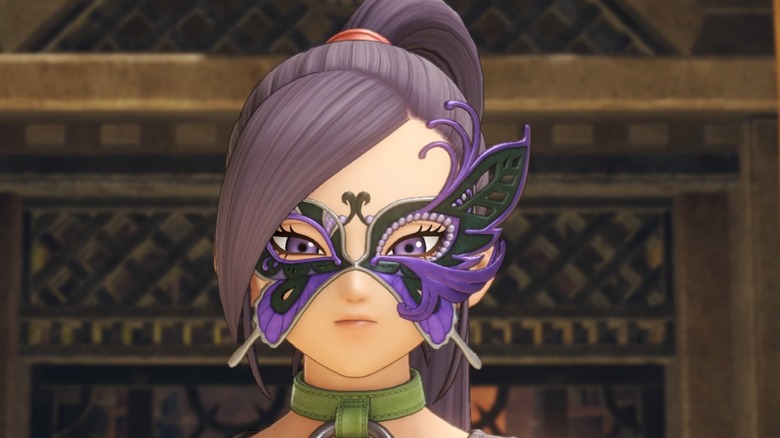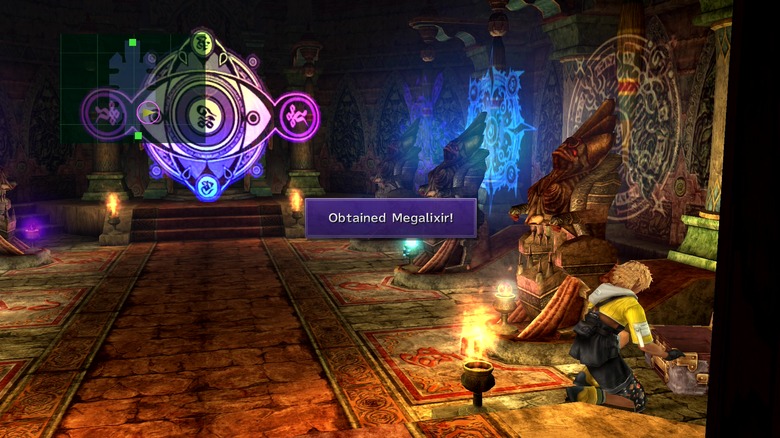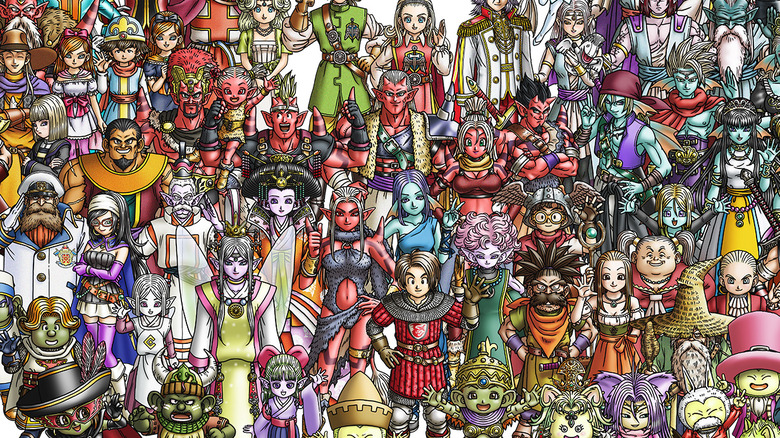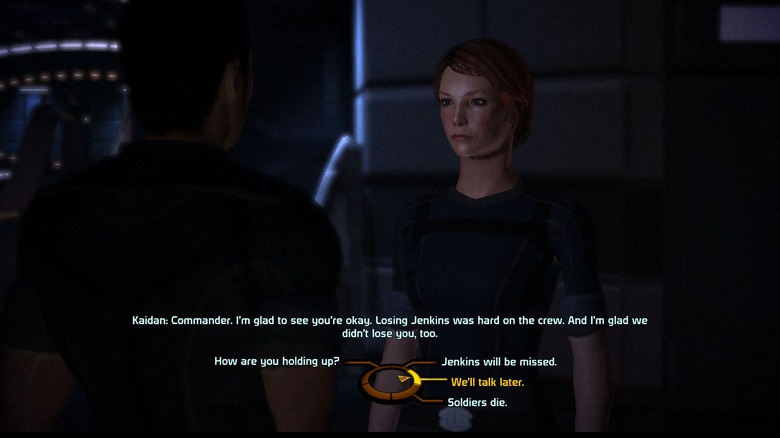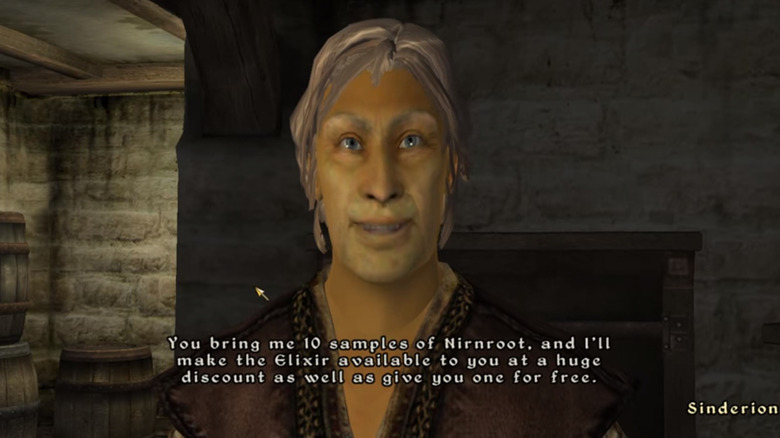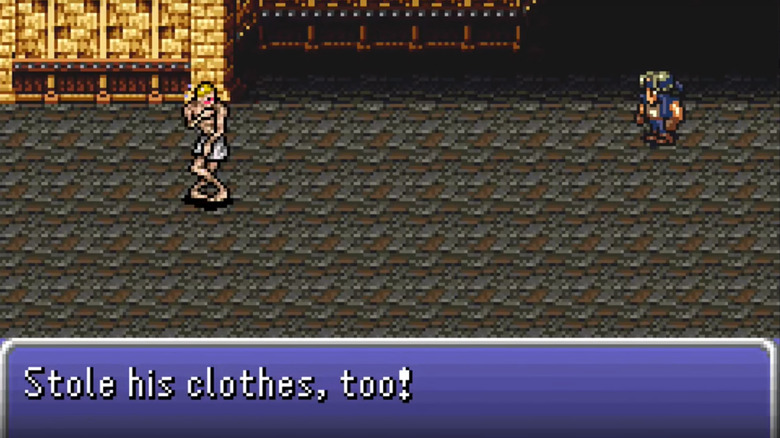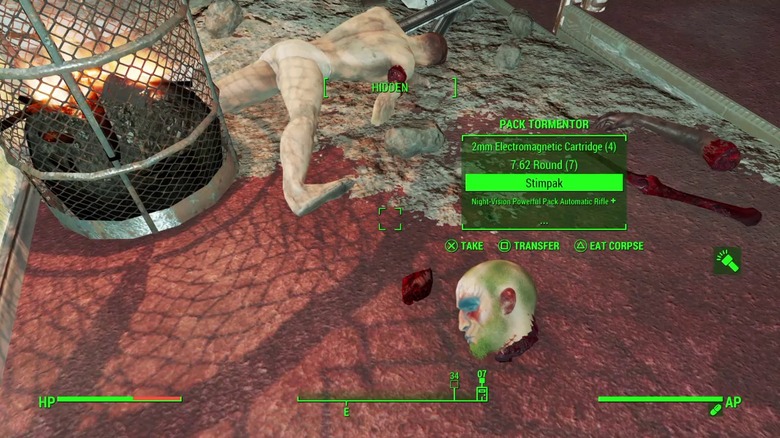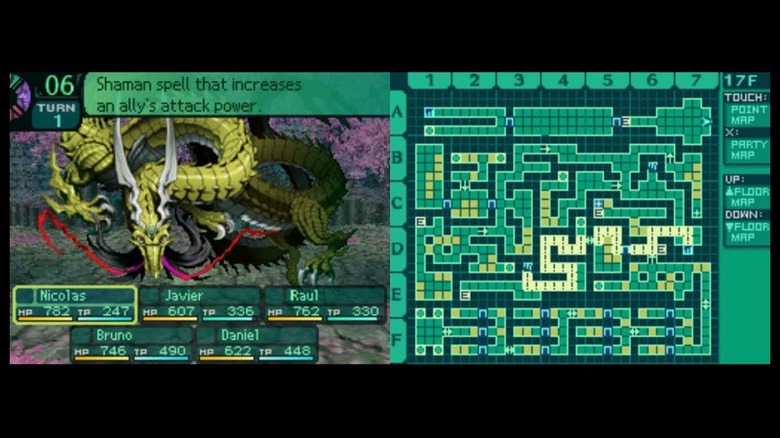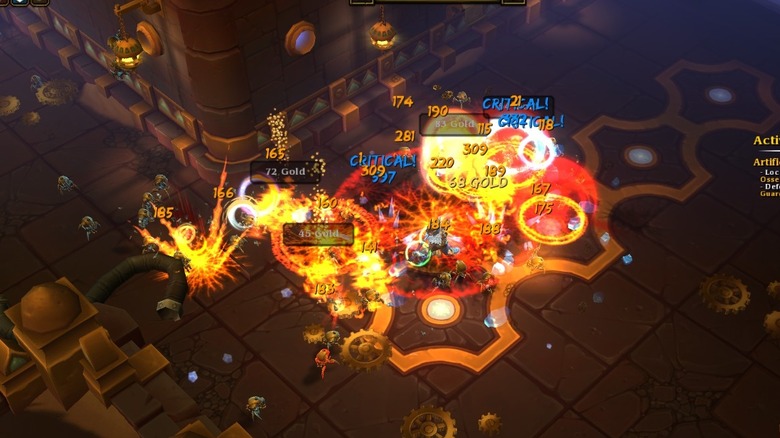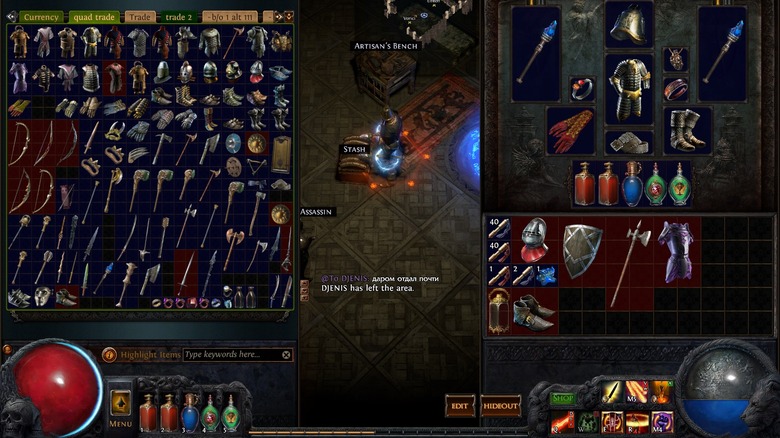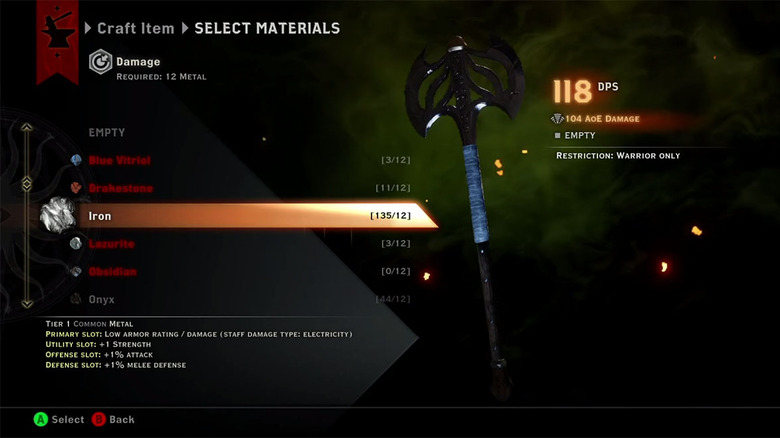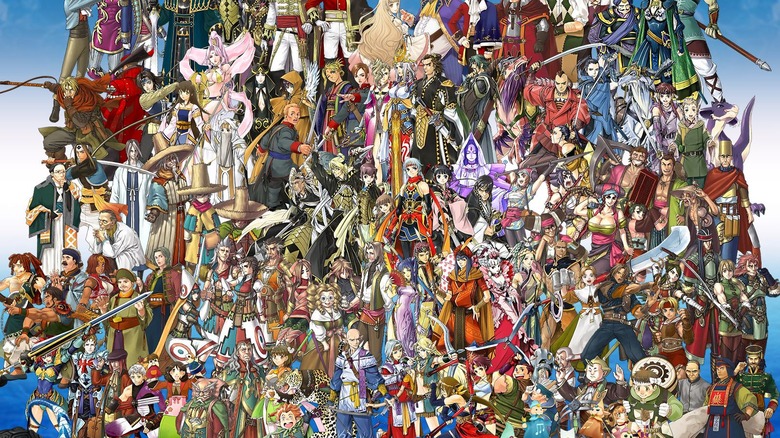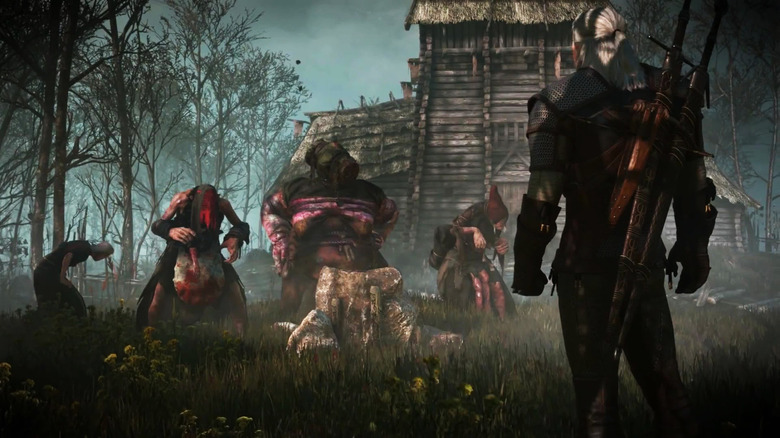Addictive Habits Every RPG Gamer Can't Avoid
Role-playing games aren't like other genres; they're investments. While Madden fans are often happy to settle for quick go-round on the gridiron, and shooter players can boot up Call of Duty and simply fire at anything that moves, most RPGs run for dozens — if not hundreds — of hours. They require attention. They demand your time.
It takes a special type of player to commit to that type of endeavor. Someone passionate. Someone dedicated. Someone who doesn't mind spending hours grinding levels, hunting for treasure, and meticulously combing through page after page of stats. Someone who is, dare we say it, a little obsessed.
As such, it's hardly surprising that most RPG players find themselves a little, ahem, overly enthusiastic about their game of choice. If you've succumbed to any of these habits while enjoying the latest role-playing game, remember: it's not your fault. It's an RPG. Addiction is just how these things go.
Saving powerful items "just in case"
Role-playing games are about stats and characters and stories and, occasionally, actual honest-to-goodness role-playing, but they're also about stuff. Lots and lots and lots of stuff. As you journey through Tamriel or Thedas or wherever, you'll pick up all kinds of goodies. Many of them are worthless. Some are useful. A few, like Pokémon's Master Balls and Ultima's deadly glass sword, are both ultra-powerful and disappear after you use them. Better save them for a special occasion.
That's the thinking, anyway. If you're a serious RPG player, you know that those "special occasions" never actually arrive. Sure, you could use a special healing item to save your party from a complete wipe, but what if you need it later? Better to start over at your last save and try again than waste your precious loot. So what if you lose a couple hours of progress? At least you'll be prepared when things get really tough.
Then you beat the final boss and the credits roll and you realize, hey, you never did dip into that pile of megalixirs or ancient potions that you've been saving. Oh well. On one hand, that's kind of a waste. On the other, well, you've got to get on that episode of Hoarders somehow, and it's like they say: practice makes perfect.
Talking to every NPC in town
In old-school RPGs, it's not always clear what you're supposed to do next. Sometimes, the location of your next quest is revealed in a single line by a nondescript NPC. A tricky puzzle can only be solved if you have a very specific piece of information. Important parts of the lore lurk behind sparsely written dialogue, and crucial character beats are hidden where you least expect them.
That's why old gaming magazines advised RPG players to "talk to everyone." Nintendo Power even called that piece advice its "top video game tip" — and that's a magazine that was practically nothing but tips. Yes, most characters tell you things you already know. No, you don't need to be welcomed to the same town numerous times. The hint you need is hiding out there somewhere, so you'd better chat up every villager you can find. If you want to progress, it's the only way (sometimes, quite literally: as TV Tropes notes, in games like Ys, you can't actually move forward until you've shot the breeze with an entire town).
These days we have cutscenes, journals, map icons, and quest markers to keep us headed in the right direction. You rarely need to speak to anyone and, if you do, modern RPGs make it pretty clear who. But old habits die hard, and many of us still end up hunting down every last character to see what they have to say, even if it's entirely unnecessary. Don't blame us. Nintendo Power trained us too well.
Talking to every NPC in town ... twice
Non-player characters in older RPGs rarely changed their tune. That's no longer true. Thanks to bigger development teams, longer production schedules, and — most importantly — a whole lot more storage space, NPCs in modern games often receive new dialogue options after major story events. If you're a completionist, you'll often find yourself talking to everyone a second (or third, or fourth, or fifth) time, just in case something has changed.
In titles like Mass Effect, checking in with your teammates after every big mission helps to flesh out their personalities. In other games, speaking to someone after helping them out might score you an exclusive item or some other valuable reward. Sometimes, you just want to be thanked for a job well done, or see what else you can learn about the world around you as characters react to current events.
A lot of the time, of course, your NPCs won't actually have anything new to say. They'll parrot the same old lines as if nothing has changed. You won't know until you try, however, so get ready to talk to everyone you see again ... and again ... and again ... and again.
Completing every side quest
Technically, side quests are "optional." Yeah, right. Technically, you don't need to make your bed in the morning, hit the walk button at a crosswalk over and over, or shower every day, but most of us do those things anyway. Similarly, if a task pops up on your quest log, it's going to be finished. That's just the way it is.
It doesn't matter if you blew past the recommended level hours ago, or if you can't equip the armor you're promised as a reward, or if you already have more gold than you could possibly spend. If the local innkeeper asked you to clear the rats out of her basement, you're going to get rid of those rats. If settlers at a distant outpost need supplies, you're going to get them those supplies. A promise is a promise.
So go ahead and decimate those low-level bandit camps, round up those lost chickens, win that Triple Triad tournament at the Golden Saucer, and endorse every shop on the Citadel. None of these things are going to make the world any safer — in fact, most of the time, they'll distract you from what's really important — but you will get to check another item off of your ever-growing to-do list. Sometimes, that's reward enough.
Picking up everything that's not nailed down, even if it isn't yours
If RPGs have taught us anything, it's this: if you can pick it up, it's yours. Find an unattended chest stuffed full of family heirlooms? If you can pick the lock, it belongs to you. Did someone leave their HP-restoring lunch unaccompanied? That's going straight into your belly. Need some quick cash? Barge into every unlocked house you can find, ransack the treasure chests, bookshelves, grandfather clocks, and other hiding places, and then unload your ill-gotten gains at the local merchant. Problem solved.
Some even let you steal from foes in the middle of a battle. Many even encourage it. Need a guard's uniform in Final Fantasy 6? Take it right off the hapless soldier's back. In search of monster scalps in Baldur's Gate? Steal the creature's entire damn head, and then leave them living to fight (and loot) another day.
But be careful. Occasionally, games like The Elder Scrolls and Fallout will punish you for stealing — if you get caught, that is. So, don't let yourself be noticed. Stick to stealth, and you'll be able to cram your item bags full of goodies. Just watch out. Eventually, you're going to run out of space, and then you'll fall victim to another tried and true RPG player habit: complaining that you don't have enough inventory slots.
Looting every single corpse, even if you're only going to end up with trash
Evil doesn't go down easy, and while you're busy saving the world, you're going to rack up a big body count. By the time your latest quest is done, you'll practically be wading through piles of corpses. Bandits, wizards, orcs, demons, aliens — it doesn't matter. Eventually, they'll all die at your hand, leaving you free to take every worldly possession that they own.
Not that most of them have anything really worth taking, of course. A few gold pieces here. A beat-up piece of armor there. That wolf has some kind of hide that you can use for crafting, but you already have hundreds of those in your inventory. That bottle of wine might taste nice, but it only heals a fraction of your hit points. Old jewelry looks fancy, but when you unload it at the local merchant, you're only going to get a few coppers.
Let's not kid ourselves: you're going to loot all of those corpses anyway. You know that the chances of finding an ultra-rare Sword of Kings or Big Elder Dragon Jewel are slim-to-none. That's not why you do it. Like we said before, RPGs are all about stuff. Leaving all of that loot lying around is a waste. So what if it's worthless? It's still better than letting anyone else have it.
Exploring every nook and cranny of a dungeon
You killed the boss. You rescued the princess. You snagged the long-lost artifact that you need to progress, lifted the curse plaguing the nearby village, or scored a stat-boosting piece of equipment. The specifics don't matter. The important part is that the job is done. Finally, you can move on and see what other surprises the game has in store.
And yet, there's something nagging at you. When you pull up the map, there are still a few sections of the dungeon covered in fog. You know you don't need to see what's there, but the mystery gnaws at you. What if there's a chest lurking in that dungeon's unknown depths? What if you can find an audio log, or a journal entry, or a corpse hiding a special piece of gear? What if there's a monster that you can only find in that one specific section of that one specific dungeon, and this is your one and only chance to see if you're good enough to beat it?
And so, instead of hopping through that portal to the exit to make progress in your 100-plus-hour adventure, you backtrack to the last fork and take the other path. In your heart, you know that there's nothing waiting for you but a dead end, but you press on anyway. You won't be satisfied until every pixel on the map screen has been uncovered. Then, and only then, can you move on with your life.
Making the game boring by over-leveling
For the most part, tabletop RPGs and video game RPGs differ in one key respect. While games like Dungeons & Dragons and World of Darkness let you become someone else, digital RPGs sell a different kind of fantasy: with work, you can become the most powerful being on the planet. Max out your stats, get the best gear, and crush your enemies with overwhelming force. By the end, you'll be nigh unstoppable.
But you can go too far. Every hardcore RPG fan knows the feeling. You know that it's time to stop hacking away at those slimes, but the next level is just a few experience points away. Developers don't help, either. Many games are designed to be as addictive as possible. You know that you're going overboard, but you can't stop fighting. The dopamine rush that you get from earning better gear and boosting your stats is just too compelling. Besides, you want to make sure you're ready for upcoming challenges. Better to be over-ready than underprepared, right?
There's one big drawback to this type of behavior, though (well, two, if you consider alienating your friends and loved ones via addictive behavior a "drawback"). Video games are delicately balanced, and if you're too powerful for the challenges you're facing, the game becomes incredibly dull. Games are supposed to be fun, not work. If you can beat the game's final boss with one or two hits, maybe — just maybe — you're doing it wrong.
Fussing with your loadout every time you pick up new gear
Not all loot is created equal, and not every RPG does a great job communicating what makes every item so special. For every role-playing game that shows you up-front exactly how a new weapon, piece of armor, rune, or other gear will affect your stats, there seem to be ten others that relegate this information to the inventory screen. In those cases, if you want to make sure you have the best loadout possible, there's only one option: pick up the gear, compare it to your current equipment, and decide whether or not it's worth keeping around.
Heavily loot-based games like Diablo 3 and Destiny compound this problem by producing items that, while they might have the same names, differ ever-so-slightly, so you can't make a snap judgement based on the title alone. Status effects and other side-bonuses make things even worse, since sometimes the "best" item isn't the one with the highest numbers. Throw in cosmetics — c'mon, don't want your character to look just as good as they fight? — and inventory space concerns, and keeping your character equipped is practically a full-time job.
There's no way around it. If you want to know if that rusty iron helm you just picked up is better than the rusty iron helm that you're wearing, you're going to have to suck it up and check.
Crafting items that you can easily buy at the store
You head into enemy territory and get creamed, and when you revive, you know the truth: you need some new gear. So, you do what any reasonable RPG fan would do: you check some online guides, spend the next few hours hunting down crafting recipes, devote another few hours to gathering the required materials, take a trip to the nearest forge — which is, of course, a few hours away — and craft the items yourself. It only takes you, what a day? And look at that. You're all ready to go.
Of course, you could simply flag down the nearest merchant and buy everything you need in a couple of minutes, but you're not going to do that. For one, that'd mean dipping into your supply of hard-earned gold. You never actually spend your cash on expensive items, of course, but it's comforting to know that you could. More importantly, though, buying things that you can make yourself is for wusses. You're not a wuss, are you?
No, the only real solution is to track down all of the crafting supplies and build what you need by hand. Just don't think about the fact that, once you gain a couple of levels, your newly-made item will be entirely obsolete and that you'll have to repeat the entire process again. For now, take pleasure in the satisfaction of a job well done.
Recruiting every single companion in the game
Not every RPG has a massive cast, but if you're playing one of the ones that does, watch out. When RPGs go big, they go really big. Chrono Cross, the PlayStation follow-up to Square's classic Chrono Trigger, has 45 characters to recruit. Fire Emblem: Radiant Dawn has 75. Suikoden and its sequels have a whopping 108.
That's a lot of characters, and if you're a completionist — and, face it, if anything on this list feels relatable, you probably are — you're going to recruit every last one of them. No, you won't have time to use all of them. No, most of their abilities aren't useful. Yes, they'll join your party significantly under-leveled and yes, outfitting them with the right equipment is going to be a huge pain.
But the question still lingers: "What if?" What if that one companion's exclusive quest is really, really cool? What if they they provide new insights into your favorite game's ultra-detailed world? What if, when everyone's teeing up against the final boss, they say something really cool? You don't want to miss out on that. Fill up your roster. It'll take time, but what's a dozen hours of extra playtime versus a lifetime of regrets? Yeah, that's what we thought.
Playing over and over until you've seen every possible story permutation
Sometimes, RPGs are about more than just numbers, combat, and loot. Sometimes, every once in a while, they find a way to incorporate actual role-playing into the proceedings. Do you detonate the bomb in Nuketown, or do you diffuse it and let the citizens live in peace? Do you support the rebel mages or the anti-magic templars? Should Geralt slay the spirit he finds in the Whispering Hillock or set it free?
Choices like those don't just add texture to their respective games. They change the story — but it's not always obvious how. If you want to know your decisions affect the games' outcome, you only have two choices: you can go online and look for spoilers, or you can play the entire game again and see the changes first-hand.
By this point, you know which option you're going to choose. Yeah, occasionally, that means that you'll spend 100 hours on a second playthrough only to learn that the dialogue tree you followed back in hour three doesn't really mean a darn thing. Other times, though, you might discover a whole new experience hiding behind a seemingly simple decision. Like going hunting for a random loot drop, it's a gamble — and RPG fans wouldn't have it any other way.

